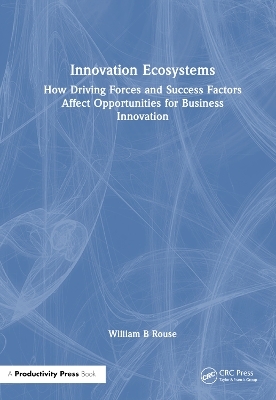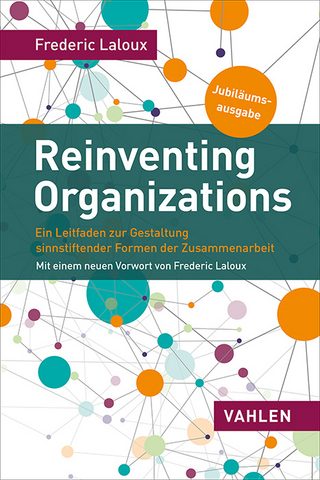
Innovation Ecosystems
Productivity Press (Verlag)
978-1-032-83041-4 (ISBN)
This book is about geography, economics, society, and innovation. Why did different regions evolve in different ways? What caused economic priorities and activities to go in one direction or another? The author believes that happenstance played a relatively minor role in this process. There were and are driving forces, as well as success factors.
In each ecosystem, ambitious immigrants arrived, displaced native populations, and proceeded to develop and exploit the geography of their ecosystem, which included leveraging water resources for transportation, commerce, irrigation, etc. They often invented the means of development and exploitation, unfortunately including slavery, but also various technical methods, tools, and devices. Inventions that became innovations enabled industries, revenues, profits, and economic growth, initially for the ecosystem and then more broadly.
The impacts of geography and economics are profound. Available resources strongly affect the options available for sustainable economic growth. This growth is fueled by technological innovations that are significantly affected by the physical, economic, and social characteristics of the ecosystem of interest.
The eight case studies in this book illustrate how patterns of these characteristics impact innovation. They also depict changes over centuries, rather than just decades or years. Today’s crises are often just blips in the ongoing evolution of an innovation ecosystem. There are ups and downs, but the physical, economic, and social characteristics of the ecosystems dominate their evolution. These factors largely determine what potential innovations are pursued, who leads these pursuits, and why they think they can succeed. People and organizations dominate the factors influencing success.
William B. Rouse is a Research Professor in the McCourt School of Public Policy at Georgetown University, as well as a Senior Fellow in the office of the Senior Vice President for Research, Professor Emeritus, and former Chair of the School of Industrial and Systems Engineering at the Georgia Institute of Technology, and Principal at Curis Meditor, a firm focused on the health of people, processes, organizations, and society. His research focuses on understanding and managing complex public-private systems such as healthcare delivery, higher education, transportation, and national security, with emphasis on the mathematical and computational modeling of these systems for the purpose of policy design and analysis. Rouse has written hundreds of articles and book chapters, and has authored many books, including most recently Design of a Human-Centered Society (Routledge, 2024), Beyond Quick Fixes (Oxford, 2023), Bigger Pictures for Innovation (Routledge, 2023), Transforming Public-Private Ecosystems (Oxford, 2022), Failure Management (Oxford, 2021), Computing Possible Futures (Oxford, 2019), Universities as Complex Enterprises (Wiley, 2016), Modeling and Visualization of Complex Systems and Enterprises (Wiley, 2015), Understanding and Managing the Complexity of Healthcare (MIT Press, 2014), Economic Systems Analysis and Assessment (Wiley, 2011), People and Organizations: Explorations of Human-Centered Design (Wiley, 2007), Essential Challenges of Strategic Management (Wiley, 2001) and the award-winning Don’t Jump to Solutions (Jossey-Bass, 1998). He has edited or co-edited numerous books including Perspectives on Complex Global Challenges (Wiley, 2016), Engineering the System of Healthcare Delivery (IOS Press, 2010), The Economics of Human Systems Integration (Wiley, 2010), Enterprise Transformation: Understanding and Enabling Fundamental Change (Wiley, 2006), Organizational Simulation: From Modeling & Simulation to Games & Entertainment (Wiley, 2005), the best-selling Handbook of Systems Engineering and Management (Wiley, 1999, 2009), and the eight-volume series Human/Technology Interaction in Complex Systems (Elsevier). Among many advisory roles, he has served as Chair of the Committee on Human Factors (now Board on Human Systems Integration) of the National Academies, a member of the advisory committee for the Division of Behavioral and Social Sciences and Education of the National Academies, a member of the U.S. Air Force Scientific Advisory Board, and a member of the DoD Senior Advisory Group on Modeling and Simulation. He has been designated a lifetime National Associate of the National Research Council and National Academies. Rouse is a member of the National Academy of Engineering and has been elected a fellow of four professional societies -- Institute of Electrical and Electronics Engineers (IEEE), the International Council on Systems Engineering (INCOSE), the Institute for Operations Research and Management Science (INFORMS), and the Human Factors and Ergonomics Society (HFES). Rouse received his B.S. from the University of Rhode Island, and his S.M. and Ph.D. from the Massachusetts Institute of Technology.
1. Innovation Ecosystems, 2. The Island, 3. Shining City, 4. Heartland, 5. Old Country, 6. New South, 7. Gotham, 8. Capital, 9. Mountains, 10. Contrasts
| Erscheinungsdatum | 21.08.2024 |
|---|---|
| Zusatzinfo | 17 Tables, black and white; 7 Line drawings, black and white; 7 Illustrations, black and white |
| Verlagsort | London |
| Sprache | englisch |
| Maße | 178 x 254 mm |
| Gewicht | 517 g |
| Themenwelt | Wirtschaft ► Betriebswirtschaft / Management ► Planung / Organisation |
| Wirtschaft ► Betriebswirtschaft / Management ► Unternehmensführung / Management | |
| Wirtschaft ► Volkswirtschaftslehre | |
| ISBN-10 | 1-032-83041-7 / 1032830417 |
| ISBN-13 | 978-1-032-83041-4 / 9781032830414 |
| Zustand | Neuware |
| Haben Sie eine Frage zum Produkt? |
aus dem Bereich


